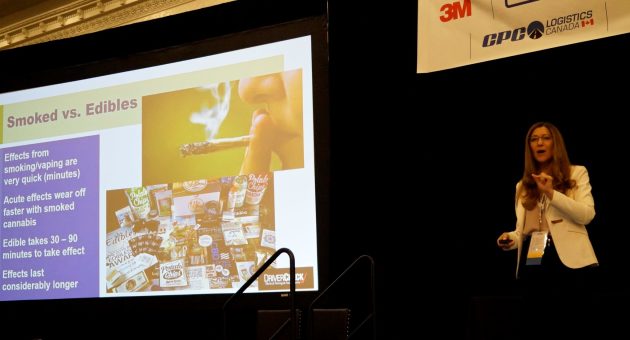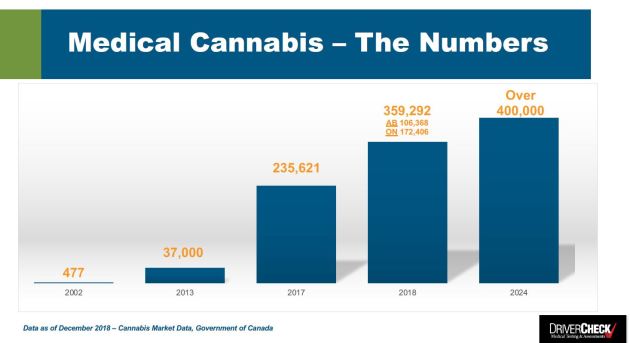Employers bracing for more pot problems: Expert

NIAGARA FALLS, Ont. – Eight months after recreational cannabis was legalized in Canada, employers are still grappling with issues related to marijuana use in the workplace.
Now, an addiction expert is warning that the problem could get much worse when edibles and concentrates become legally available, probably by October this year.
“Once we have edibles, once we have concentrates that is when we may see some differences in the workplace,” Dr. Melissa Snider-Adler of DriverCheck told delegates at the Private Motor Truck Council of Canada’s annual conference in Niagara Falls, Ont., on Friday.
 Concentrates contain 60 to 90% of THC, the main psychoactive component in marijuana, and the problem with edibles is that people overconsume, she said.
Concentrates contain 60 to 90% of THC, the main psychoactive component in marijuana, and the problem with edibles is that people overconsume, she said.
“One dose of an edible is one gummy bear, one square of a chocolate, one potato chip, one sip of a drink…but what happens is people overindulge.”
Over the years, the percentage of THC in pot has increased dramatically, Snider-Adler said. Until the 1980s, people used marijuana that contained between 1 and 5% of THC. Now products with up to 30% are legally available in Canada, she said.
“And, it wasn’t like people in the ’60s and ’70s were not getting high. They were.”
Soaring usage of marijuana in the wake of legalization is posing an array of challenges to safety-sensitive industries including the trucking sector, with potential impairment being the main concern.

Studies in British Columbia and Ontario have shown that cannabis use prior to driving increases the risk of being involved in a motor vehicle accident. Many truck drivers still turn to pot when they have pain because they believe their pain impairs them more than the joint, Snider-Adler said.
She said the cannabis problem in the trucking industry is just as big as in any other industry.
Some provinces have adopted a zero-tolerance policy for commercial drivers as a deterrent but the rules in Canada are as not as strict as in the United States.
“For DOT drivers, it is black and white. No cannabis use is accepted legal or not, medical or not. It is an absolute zero tolerance. DOT does regular drug testing – pre-employment, random etc. With testing, many individuals using cannabis will not even apply to be a DOT driver,” Snider-Adler later explained.
So, those who want to drive a truck and use cannabis then choose to be non-DOT drivers as there are at the moment no federal regulations and no mandate to test, she said.
If they get caught, many obtain an authorization for medical purposes to avoid the issues of testing above the blood levels as in some provinces there are exceptions made if there is medical authorization.
“This puts the employers in a difficult position. They cannot just institute testing and certainly not necessarily random testing. So the issue with cannabis use is much greater in non-DOT drivers.” Snider-Adler said.
 The Canadian Cannabis Survey of 2018 showed that 22% of those polled reported using non-medical cannabis in the previous 12 months, while 13 % said they used medical cannabis. Of those using medical marijuana, 66% did so without a permission from a physician, Snider-Adler pointed out.
The Canadian Cannabis Survey of 2018 showed that 22% of those polled reported using non-medical cannabis in the previous 12 months, while 13 % said they used medical cannabis. Of those using medical marijuana, 66% did so without a permission from a physician, Snider-Adler pointed out.
The number of medical marijuana users in Canada has skyrocketed from a mere 477 in 2002 to nearly 360,000 in 2018, she said, citing Cannabis Market Data released by the federal government. That number is expected to top 400,000 by 2024, dealing a major blow to safety-sensitive industries, where 22% of Canadians are employed.

PMTC president Mike Millian said his association and other industry lobbying groups have been pushing for tough regulation for quite a few years, but human rights questions have complicated the issue.
While the government has been receptive to their ideas lately, Millian doesn’t expect any new legislation until after October’s federal election.
Have your say
This is a moderated forum. Comments will no longer be published unless they are accompanied by a first and last name and a verifiable email address. (Today's Trucking will not publish or share the email address.) Profane language and content deemed to be libelous, racist, or threatening in nature will not be published under any circumstances.